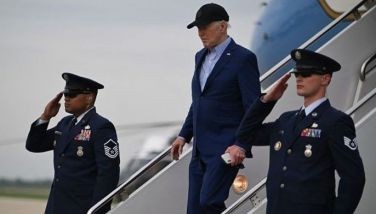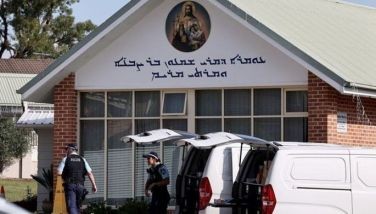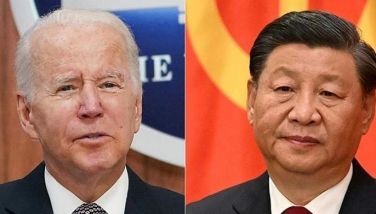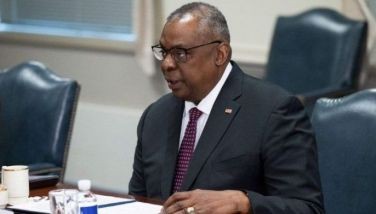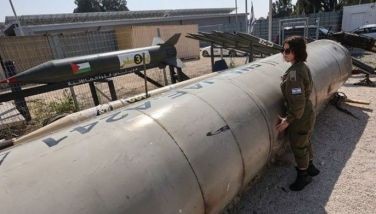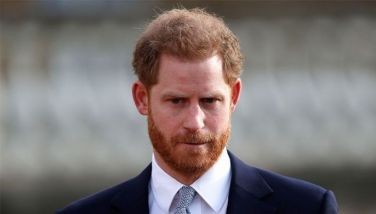Taiwan leader heads to Americas; US stops set to irk China
BEIJING — An official with President-elect Donald Trump's transition team said yesterday that neither Trump nor transition officials would be meeting with Taiwanese President Tsai Ing-wen when she makes transit stops in the US during her trip to the Americas.
Still, Tsai's trip will be scrutinized by Beijing for any signs that Trump's team will risk its ire by further engaging with the self-ruled island that China considers its territory.
Tsai, who departed Taipei on yesterday, pledged to bolster Taiwan's international profile as she set off on a trip to reinforce relations with diplomatic allies in Central America, a task that has taken on new urgency as Beijing ramps up efforts to diplomatically isolate Taipei.
Speaking to reporters before her departure, Tsai said the visits to Honduras, Nicaragua, Guatemala and El Salvador would "show the international society that Taiwan is a capable and responsible partner for cooperation."
She will transit through Houston and San Francisco, stops that will irk Beijing, which has urged Washington to prevent Tsai from landing in the US to "refrain from sending any wrong signal to the Taiwanese independence forces."
Beijing regards the self-governing island as part of China and officials complained after Trump last month breached diplomatic protocol by speaking by phone with the Taiwanese leader. Trump raised further concerns in Beijing when he questioned a US policy that since 1979 has recognized Beijing as China's government and maintains only unofficial relations with Taiwan.
US lawmakers often meet with Taiwanese presidents when they transit through the US — most recently in June, when Tsai met in Miami with Republican Sen. Marco Rubio of Florida.
Trump transition spokeswoman Jessica Ditto said in an email yesterday that the president-elect would not be meeting with the Taiwanese leader while she is in the US, nor will members of his transition team.
Trump sounded unaware of the potential trip when he was asked about it on New Year's Eve.
"Nobody's ever mentioned that to me," he told reporters. "I'm not meeting with anybody until after Jan. 20, because it's a little bit inappropriate from a protocol standpoint. But we'll see."
Tsai is likely to keep the US stops low-key to avoid further inflaming tensions with China, which has been angered by her refusal to endorse Beijing's concept that Taiwan and the mainland are part of a single Chinese nation.
Beijing says failing to endorse the one-China principle would destabilize relations and hurt peace in the region. In late December, in what Beijing called routine exercises, China's first and only aircraft carrier and a fleet of warships sailed past Taiwan's south, prompting Taipei to deploy fighter jets to monitor the fleet.
"I'm confident that both Taiwan and the US want this transit to be low profile," said Bonnie Glaser, senior adviser for Asia at the Center for Strategic and International Studies. "There is nothing to be gained by irritating Beijing."
In Central America, Tsai will focus on strengthening ties with allies to fend off Beijing's efforts to draw governments away from Taipei and further diminish its global presence. Beijing and Taipei have competed for allies for much of the nearly seven decades since the end of China's civil war in 1949, when the defeated Nationalist government fled across the Taiwan Strait.
Tsai, who is leading a delegation of 120 people, will meet with most of the four countries' leaders and attend the inauguration of Nicaraguan President Daniel Ortega. She said she would also interact with the heads of state of other countries at the inauguration.
Beijing has intervened to prevent the island's participation in international forums and established diplomatic relations with former Taipei allies Gambia and Sao Tome and Principe. The moves have been seen as effectively abandoning the unspoken diplomatic truce that lasted eight years under Tsai's China-friendly predecessor. Just 21 countries and governments, mostly in Latin America and the Caribbean, now have official ties with Taipei.
Observers were watching to see if any of the four Central American nations might defect despite Tsai's efforts, but say stronger US support under Trump's administration would help balance future diplomatic losses.
"We should expect that in the Trump administration the US would be more vociferous and emphatic about Taiwan's participation in international organizations," said Ross Feingold, a Taipei-based senior adviser at D.C. International Advisory, a consulting firm whose chief executive has been consulted by the Trump transition team.
Although the US does not challenge China's claim to sovereignty over Taiwan, Washington remains Taiwan's main source of weapons, with $14 billion in approved arms sales since 2009, and is bound by law to consider threats to the island's security a matter of "grave concern."
If Beijing aggressively pursues existing Taipei allies, leveraging its growing economic, military and political clout, the competition could prove too expensive for Taipei and prompt Tsai to seek even deeper ties with the US
"She may think now that it's America or bust," said Sean King, a Taipei-based senior vice president at consulting firm Park Strategies. "She's probably going to lose these peripheral countries eventually anyway, so why not go for the gusto and get as close to the US while she can?"
- Latest
- Trending














